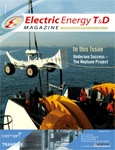
José Barbosa, CEO, Advanced Control Systems, An EFACEC Company
In this, our final installment of the Automation/IT Leadership Series for 2007, is my interview is with José Barbosa, the newly appointed CEO of ACS. José replaces John Muench, the iconic founder and chairman of ACS since its inception in 1975; a person who has left an indelible mark on both his company and the industry as a whole. Yet despite being new to ACS and North America, José is himself anything but a novice when it comes to the automation/IT marketplace. A seasoned executive with extensive experience in the electric system automation markets and applications around the world, José offers a fresh and insightful look at the shape of things to come. With this expanded commitment to a vibrant and increasingly global marketplace, the ACS-EFACEC combination holds the potential for ACS’ traditional customer base among municipal and rural electric utilities as well as larger investor-owned utilities to access a new level of resources and capabilities.
When it comes to DMS & SCADA suppliers in the electric utility sector, most of the players have held established positions in the marketplace for at least 25-30 years; even longer in many cases. Over the years, utilities have benefited from the stability that resulted from these longstanding supplier relationships, as have the suppliers themselves, of course. Among other things, these buyer-seller bonds have made breaking into the North American SCADA market no small challenge, even for some of the world’s largest and most capable suppliers. As such, it’s not very often that there is a fundamental change of the type involving Advanced Control Systems (ACS) of Atlanta, Georgia, which took place just about a month ago. Indeed, with the acquisition of ACS in October by Portugal’s EFACEC, one of North America’s oldest and best known privately-held DMS & SCADA suppliers now moves squarely into the global arena. – Ed.
EET&D: Although Advanced Control Systems is widely known as a leading supplier to the North American electric automation/IT marketplace with a long history and literally hundreds of successful projects to its credit, it’s probably safe to say that EFACEC is not nearly as well known here in the United States and Canada. Clearly, that is not the case in other parts of the world, so perhaps we should begin with some background about EFACEC. I think it would be helpful if you could give our readers a quick overview of the parent organization before we move on to your plans for ACS.
Barbosa: First, Mike, I want to thank you for the opportunity to share the combined vision of ACS and EFACEC with the readers of Electric Energy T&D. Well, first of all, EFACEC is a Portuguese company founded in 1948 and headquartered in Oporto with more than 3,000 employees around the world. In broad terms EFACEC focuses on the power, transportation and environmental sectors. You are correct that our North American business presence has been focused on serving a few major accounts such as Florida Power and Light and Nevada Power, and we’ve kept a low profile, but that is changing quickly.
In the most recent fiscal period about 50% of our $600M in global revenue is generated within our traditional European markets, but North America is our third largest revenue stream, after Europe and Africa. We plan for North America to grow significantly as a pro forma percentage of revenue in the coming years, and EFACEC is making some major investments to support that goal. Today, North America already accountsfor nearly a quarter of our manufactured equipment exports, namely power transformers and mobile substations. So, we’re actually much more established here in the supply of electrical equipment to major utilities across the region than many of your readers may realize. As our investment in the acquisition of ACS confirms, North America is a major focus for us.
EET&D: EFACEC certainly seems to be a very capable and successful company that will bring a new dimension to the North American utility automation/IT marketplace. With all of the capabilities and resources at your disposal, I think a logical question that many of our readers might ask would be, why ACS and why now?
Barbosa: Clearly, we see North America as an important growth opportunity in several dimensions, one of the most important of which is automation and information technology. There is also a great need for infrastructure replacement to meet the aging power infrastructure demands in North America. In addition to the acquisition of ACS, we have also just announced plans to build a brand new, state of the art, $100 million transformer manufacturing plant in southeast Georgia, which will create hundreds of new U.S. jobs within EFACEC and inject some much needed investment into the local economy.
And, as we have deepened our roots here, we’ve also come to realize that US utilities are demanding a re-invented ‘smart grid’, not just a replacement grid. We bought ACS to provide us our thrust here since we recognized ACS as an industry leader in this important area of innovation. Proof of this is the recent introduction and the first field implementation of our self-healing feeder automation and substation technology platform.
I should also point out that the acquisition of ACS is not a first move into automation/IT for EFACEC, but rather a logical geographic expansion of our already well-established and highly successful EFACEC automation/IT business in many other parts of the world. As CEO of ACS, I report into the EFACEC Americas organization led by Jorge Guerra, so ACS is now an integral part of our larger global power systems automation group based in Portugal and led by Mário Clemêncio.
EET&D: So how do the North American market and the corresponding ACS offerings fit with your traditional products and services? In other words, does the market footprint ACS has established here among municipal utilities and rural electric cooperatives complement, expand or overlap with EFACEC’s experience in other parts of the world?
Barbosa: There are some areas of product offering overlap, but overall this is a synergistic relationship on multiple fronts. Let me explain exactly what I mean by that. ACS has held an enviable market presence here in North America, primarily among municipalities and cooperatives with literally hundreds of installations spanning three decades. While ACS has also had important recent successes with larger investor-owned utilities – and counts as customers many large utilities outside North America such as Taiwan Power, where we delivered what is arguably one of the most advanced DMS and distribution automation systems in the world – ACS has built its reputation as a stable and reliable systems supplier to small and mid-size North American utilities.
As we go forward, EFACEC will help accelerate the elevation of ACS into that next tier of larger systems suppliers and with a much broader geographic reach. More specifically, EFACEC’s extensive global experience in the automation field for the electrical sector comprises more than 700 integrated system installations for substation protection, command and control including DMS systems in Portugal, Brazil, Algeria and Switzerland as well as ongoing projects in other countries. This will be the complementary part of our plan, but let me be clear that it will not happen at the expense of the strong reputation ACS has established for providing its existing customers with innovative solutions, competitive prices and exemplary support over the long haul.
EET&D: I can see how having the resources of a major international company behind it will be beneficial to market expansion and future revenue growth, but what about the overlaps and redundancies?
Barbosa: First let me make clear that there are no staff redundancies and we will be growing the base of ACS out of Atlanta and adding more R&D, engineering and service resources here to support the growth of our North American customer base. Also, in competing for the opportunity to acquire ACS, we recognized some areas of minor product overlap but we determined early on that those aspects were quite small compared to the substantial synergies, both geographically and from a market standpoint.
Our business integration teams will further study the technologies and the respective markets to determine how to best move forward in those areas where we see the need for product consolidation. Of the utmost importance to us during this process will be maintaining a well thought out migration path for our existing customer base. A cornerstone of ACS’ success over the years has been the long-term support of its products and customers. We fully intend to continue with that philosophy.
EET&D: The issue of product strategy and consolidation going forward brings up an interesting point: International Standards. How do you see these new standards evolving and what impact do you think they’ll have on the global automation/IT marketplace?
Barbosa: After more than 50 years of proprietary architectures and protocols, most electric automation and IT systems sold in North America today already employ a high degree of standardization and interoperability. ACS was one of the early market innovators regarding integration of the DNP protocol that has been very successful. Of course, that is also true in Europe and other parts of the world where many of those same standards, like DNP3, are also quite popular.
Important new international standards like IEC 61850, which deals mainly with substation IED communications, and IEC 60870, which focuses on system-to-system communications are also evolving and gaining traction. Certainly it will take years before these international standards fully take hold, and although they will probably never achieve 100% penetration, they will definitely have an increasingly global impact. ACS will continue to support DNP and, based upon market demand, we will also bring forward new capabilities to support these other standards that are already in use with practical implementations within the EFACEC system automation portfolio.
EET&D: Yes, it certainly seems that global standards will be an implicit part of automation/IT solutions the world over in the years ahead. However, that raises another question: What are your thoughts regarding data security as it relates to SCADA and other critical infrastructure protection issues?
Barbosa: Systems security is clearly a hot button priority issue both in the US electric automation market and abroad. But security should not be an excuse for a lack of standards adoption since this is vital to the development of the smart grid. ACS fully supports the measures around critical infrastructure protection such as the NERC CIP standards, and is working closely with our customers to ensure that they meet the necessary requirements where their critical cyber assets are concerned.
This effort involves everything from the security of our support systems and staff to the integration of best-of-breed security technologies into our comprehensive system solutions. EFACEC is 100% committed to the ACS mission of providing the highest levels of system security available while continuing to deliver open architecture solutions that provide our customers with implementation flexibility and enterprise interoperability.
EET&D: You’ve already said that EFACEC is a diversified organization with involvement in the environment, transportation and other infrastructure business areas. Should we expect these other dimensions of EFACEC to have any immediate or longer term impact on your automation/IT business here in North America?
Barbosa: As the new CEO of ACS, I am focused with the rest of the ACS management team on further building upon the strong market position that we hold in the emerging smart grid marketplace. Software and automation systems will play a key role in enabling the many clean technology innovations happening around the world, including some of those EFACEC is developing out of our corporate operations in Portugal. How and when EFACEC will bring these other capabilities and products to the North American marketplace will depend on the market conditions here.
EET&D: Many of the executives we interviewed for the Automation/IT Leadership Series throughout the past year have touched on the topic of Smart Grid in one way or another. Although we are primarily focused on the challenges we’re facing here in North America, this is not the only place in the world that is trying to make an old infrastructure do new tricks, so to speak; especially with regard to the almost universal goal of making power transmission and delivery more dynamic, more sophisticated and more flexible while also complying with new regulatory guidelines and improving reliability – all of which is no small task. Everyone seems to agree that the answer is a more intelligent grid. What are your thoughts about how we should go about doing that? Also, are there any parallels you’ve perhaps observed in other parts of the world that might shed some light on the best way forward?
Barbosa: ACS holds a unique place in the smart grid marketplace with its combination of systems and automation technology developed in close partnership with its long-term customers including leaders like San Diego Gas & Electric, Cobb EMC, the City of Anaheim, CA and Amtrak. Clearly the US utility marketplace and government leaders have recognized that a smart grid approach is the only sensible one for the needs of this country in the next century. Security, quality, reliability and availability are all critical components of this smart grid vision. And, while there is a great deal of emphasis at present on the role of demand response in the intelligent grid, perhaps the most critical business issue facing the industry today is improving reliability.
One of the key benefits to higher reliability is improved customer service, but just as important is the positive financial impact for the utilities and to society-at-large. Automation and self-healing networks will be a key ingredient to achieving reliability goals. We are finding a tremendous amount of interest on the part of many key distribution utilities throughout North America in our fault detection, isolation and restoration (FDIR) technology. The ability to provide utilities with both control center-based and substation-based solutions to this critical issue is an important part of our smart grid strategy.
Of course, the focus on the advancement of intelligent grid technologies is not unique to the United States. Just last month in Portugal, the InovGrid project was announced, a $100 million smart grid initiative involving the major Portuguese distribution utility and several other stakeholders, including EFACEC. Clean, reliable, and efficient electric power is vital to economic growth worldwide, and that is why we are so excited about the smart grid market growth prospects for ACS and EFACEC going forward.
EET&D: José, thanks again for giving our readers the opportunity to be among the first to learn about EFACEC and sharing some of your plans for North America. I’m sure we’ll be talking again soon and often as things progress. Best of luck to you in the challenges that lie ahead, and welcome to North America!
Barbosa: Thanks again for the opportunity to inform your readers about EFACEC and our expanding industry involvement and investments here. I look forward to meeting with the many ACS customers and Electric Energy T&D readers across the United States and Canada in the months to come.







